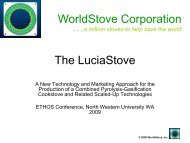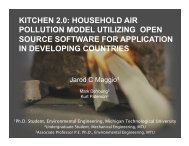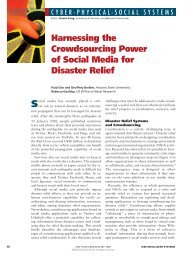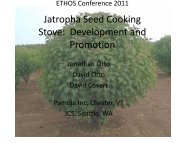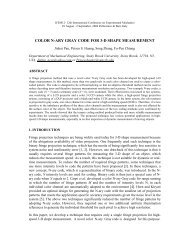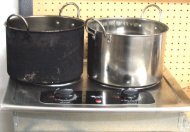Making Stoves and Fixing Carbon
Making Stoves and Fixing Carbon
Making Stoves and Fixing Carbon
- No tags were found...
You also want an ePaper? Increase the reach of your titles
YUMPU automatically turns print PDFs into web optimized ePapers that Google loves.
<strong>Making</strong> <strong>Stoves</strong> <strong>and</strong><strong>Fixing</strong> <strong>Carbon</strong>Trees, Water & PeoplePROLEÑAAprovecho Research Center
Trees, Water & PeopleTWP is a 501(c)(3)not-for-profitorganization thatimproves people’slives by helpingcommunities protect,conserve <strong>and</strong>manage the naturalresources uponwhich their long-termwell-being depends.
PROLEÑAPROLEÑA is a Nicaraguannot-for-profit organizationthat promotes biomassbasedenergy technologies<strong>and</strong> sustainable biomassproduction.
TWP in Latin America Has been working in Latin America since 1998 Has established reforestation <strong>and</strong> fuel-efficient stoveprojects in Central America, Mexico, Brazil, <strong>and</strong> Haiti Has produced <strong>and</strong> planted 1.6 million trees <strong>and</strong> builtmore than 23,000 fuel-efficient stoves
Two-Pronged Approach to Sustainable Energy& Forest ConservationCommunity reforestation to increase supply of treesFuel-efficient stoves to reduce the dem<strong>and</strong> for trees
Fuelwood usage in Nicaragua• 50% of urban families use fuelwood for cooking, for atotal of over 120,000 families in the seven largest cities• 90% of rural families use fuelwood for cooking• 95% of fuelwood users use traditional open-fire stoves
Forest Replacement Associations (FRAs) FRAs are designed to create a local, sustainablesupply of fuelwood for commercial <strong>and</strong> domesticconsumers (e.g. brick makers, potters, limeproducers) By joining a FRA, local businesses contributemoney towards producing new tree seedlings inour local nurseries Seedlings are sold at a reduced price to localfarmers who harvest the trees within 3-5 years <strong>and</strong>sell them back to local commercial fuelwoodconsumers
FUNDANIC Project In 2007 the EU partnered with TWP <strong>and</strong> PROLEÑA fora project to produce 1 million trees over 4 years in FRAtree nurseries 500,000 trees produced in 2007, for a total of 256hectares (633 acres) planted
Micro-enterprise Stove Project Goals To produce quality stoves to reduce IAP,fuelwood consumption, <strong>and</strong> greenhouse gasemissions To disseminate the improved stoves to thehundreds of thous<strong>and</strong>s of rural <strong>and</strong> urbanfamilies in Nicaragua still using traditionalstoves To create a self-sustaining micro-enterprise thatcan serve as a model for stove projects in othercountries
Project Methodology Central stove factory to produce <strong>and</strong> sellstoves Micro-enterprise model for sustainabledevelopment Sales to families <strong>and</strong> businesses thatcan afford full price Subsidies, layaway plans, or microcreditfor the working poor, especially tortilla<strong>and</strong> nacatamal producers/vendors
The EcoStoveA metal fuel-efficient stove developed by TWP,PROLEÑA, <strong>and</strong> Aprovecho
The EcoStoveTWP <strong>and</strong> PROLEÑA havebuilt over 8,000 Eco<strong>Stoves</strong>in Nicaragua since 2000.Target Populations:• Urban Low IncomeFamilies• Urban Entrepreneurs(tortilla & nacatamalmakers)
EcoStove Models$97 $109$84$163
Benefits of the EcoStove• Reduces respiratoryproblems <strong>and</strong> other healthimpacts of Indoor AirPollution• Saves money on fuelwoodso businesses can be moreprofitable•Reduces deforestation <strong>and</strong>greenhouse gas emissionsby consuming 30-50% lessfuelwood compared totraditional cook stoves
Study on EcoStove Greenhouse GasEmissions Reductions Kitchen Performance Test (KPT) conducted forClimate Care Ltd. by the consulting firmsAmbiental PV <strong>and</strong> ENASA Annual reduction in CO 2 emissions estimatedbased on the amount of fuelwood used bytortilla <strong>and</strong> nacatamal (tamale) producersusing Eco<strong>Stoves</strong> vs. traditional stoves
Study Results – KitchenPerformance Test (KPT)Stove model Food designed forTonnes CO 2avoided/yr/stoveEcoFogon Tortillas 4.9EcoBarril Nacatamales 1.1
Analysis of Study Results EcoFogon users showed great variation in fuelwoodusage based on tortilla production. Tortilla producerswith greater output from working all day long did notwaste energy bringing the thermal mass of the stove upto temperature three times a day, so they used lessfuelwood per gram of dough cooked. Both models tested have deviated somewhat from LarryWiniarski’s stove design principles, making themappropriate only for larger commercial producers. For smaller commercial producers <strong>and</strong> domestic users, astove consistent with stove design principles (e.g. theHonduran EcoFogon) would be more appropriate.
Monitoring Stove longevity will be monitored to determine howmany years of emissions reductions can be credited Students from Colorado State University (CSU) <strong>and</strong> theNational University of Nicaragua (UNAN) are planning astudy to measure IAP emissions <strong>and</strong> health of women<strong>and</strong> children before <strong>and</strong> after switching from traditionalstoves to Eco<strong>Stoves</strong>
Challenges <strong>and</strong> Solutions Metal prices have risen dramatically, raising cost of stoves- Seek higher volumes to lower metal prices Eco<strong>Stoves</strong> now too expensive for the poor- Offer installment plans <strong>and</strong> layaway payment options- Offer micro-credit via FINCA, FAMA (Foundation forMicro-enterprise Support), FDL (Fund for LocalDevelopment), FODEM (Fund for Women’s Development)- Provide 30% subsidy with support from Rotary Clubs<strong>and</strong> TWP for working poor- Seek other international <strong>and</strong> national NGOs <strong>and</strong>government agencies as purchasers
Conclusions Need more advanced stove production methods toreach the hundreds of thous<strong>and</strong> of families who needimproved stoves in Nicaragua Micro-credit is a key component to make stovesaffordable for the majority of families in Nicaragua More linkages with government agencies, other nonprofitgroups, <strong>and</strong> private sector to raise awareness ondangers of indoor air pollution to women <strong>and</strong> children More research, development, <strong>and</strong> funding needed tolower production costs, improve fuel efficiency, <strong>and</strong>disseminate stoves more widely
Funded by Rotary Clubs <strong>and</strong> Rotary International Trees, Water & People Ashden Award/Climate Care/Pioneer<strong>Carbon</strong> European Union (reforestation project) <strong>Carbon</strong> Clear (kiln project)
Contact InformationMarlyng BuitragoPROLEÑAVilla Arlen SiuStuart ConwayTrees, Water & People633 Remington St.Fort Collins, CO 80524stuart@treeswaterpeople.orgwww.treeswaterpeople.org970-484-3678Del nuevo PALI las Americas 75 varas al surManagua, Nicaraguambprolena@hotmail.comwww.prolenaecofogon.org011-505-280-6406, 505-883-4144



